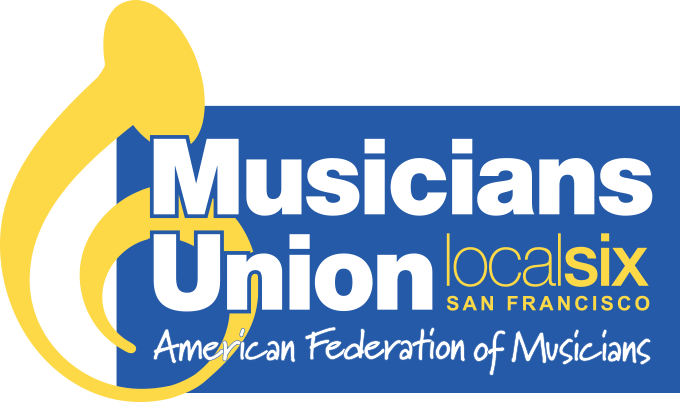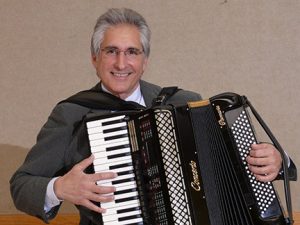
“Everything happened for me at fifty. I quit my day job and then I got married. Before that I didn’t have time for anything else but my day job and my music gigs.”
Ron Borelli: “Music Makes Me Feel Complete”
by Alex Walsh
Ron Borelli is a native San Franciscan and a Life Member of Local 6. Brought up in a musical family, he played accordion and piano for San Francisco’s tight-knit Italian community with his father in The Al Borelli Band, for many years. When Ron turned fifty he retired from his career as a banker, took over his father’s business and became a fulltime musician.
When Ron Borelli was seven, his father came home one day and asked if he wanted to learn how to play accordion. Ron jumped at the chance. “My grandfather played accordion. I used to see my father play tenor sax and my uncle play accordion at parties and it looked like a lot of fun. I think my father had an ulterior motive because he knew that when I was old enough I could join their band, which is what ended up happening.”
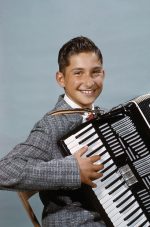
Ron at age 10
Accordion was very popular in the early 1950s. In San Francisco, teachers went door to door soliciting students and giving lessons. Ron started playing this way and a year later his father took him to a professional accordion player named Bud Sigeri who taught Ron chords and theory. He then began studying with Dino Bennetti, a popular teacher who had his own accordion school. “His approach was to teach tunes so you could get gigs. When I was fourteen my father said, ‘Do you want to start playing some jobs?’ My first New Year’s Eve gig was a solo in Pacific Heights. I remember a woman came over to me at midnight and gave me a big kiss on the cheek. I was so embarrassed I turned beet red.”
When he was sixteen, Ron began playing with his father’s band. His father played sax, Ron played accordion and keyboards, his younger sister sang, and his cousin played drums. “We were a family band. We did the occasional high society event but we mainly played Italian parties, picnics, weddings, and anniversaries. My father never advertised. It was all word of mouth. He was busy all the time, at night during the week and four or five gigs in a weekend.”
Along with music, Ron’s father worked for Hills Brothers Coffee, which had a plant on the Embarcadero in San Francisco. “He basically worked two full time jobs, his coffee job and music. It was tough on the family. His story is one of the typical immigrant coming from Italy when he was young with absolutely nothing. My parents got married and luckily he knew how to play music. He was able to do that on the side with another job that helped pay the rent and raise a family.” Ron’s mother owned a beauty salon.
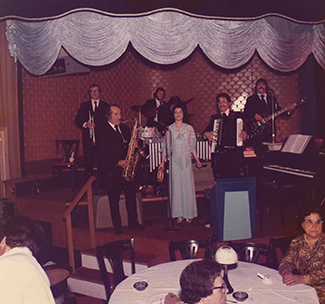
The Al Borelli Band in the mid-80s at Bimbo’s in San Francisco. Front: Al Borelli, sax, Carole Borelli, vocals, Ron Borelli, accordion and piano. Rear: Waldo Carter, trumpet, Jim Spelman, drums, Bill Moscardini, bass
Ron grew up in the Excelsior district of San Francisco. In 1962, when he was in high school, his parents bought a house in Daly City. By this time the accordion was out of style. With no place for the accordion in his school band Ron started his own group and with his father’s help they began working professionally.
“This was in the era when the popularity of the accordion was going down. If you went into a music store in the early fifties they would be lined with accordions. As soon as Elvis Presley came out the guitars came in. By the time the Beatles came out you couldn’t even find an accordion in the stores.”
When Ron started school at SF State in 1964 he was unsure of his major. Though his dream was to study music and be a jazz musician, he felt very insecure about his musical skills compared to the other students. Adding to the pressure, Ron’s father said he should be practical. “I took an accounting class and thought maybe I would major in accounting and get a music degree afterwards–I ended up not getting the music degree at all.”
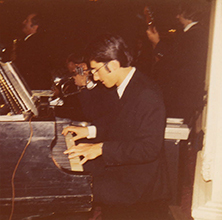
Ron in his early 20s
Ron worked as much as he could with his father’s band and his own band to pay his way through college. He was not at all interested in the burgeoning rock scene or the youth revolution happening in the Haight Ashbury but instead loved hanging out in the North Beach jazz clubs. By now the accordion was so uncool that when people asked him what he did he said he was a pianist. Ron began lugging his electric piano to all of his gigs and even tried to convince his father that he should quit the accordion but his father balked at the idea.
In 1969, Ron graduated college and started working a day job. “I went to see the school counselor about getting a music degree. ’Why do you want to do that?’ she said, ‘You just got an accounting degree.’ I didn’t have an answer other than I wanted one, and my parents were really pushing me to get a job, so I told myself I would go work for six months and that I could always come back. I ended up getting a job in a bank.”
Ron was hired as a manager trainee at Bayview Bank, a local family run bank based in San Francisco. After six months they gave him a raise, and with his father’s encouragement, he decided to stay. “I was playing music the whole time, mainly with my dad. I was trying to do my own thing but my dad had so much work I didn’t have time to really do things for myself. He would say, ‘Ron, this weekend you’ve got this, this, and this.’ I’d go play the gigs and then Monday morning I’d go do my bank job. Every now and then we’d have gigs during the week.”
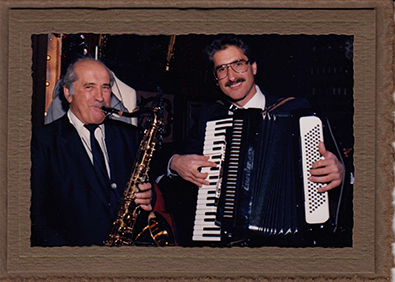
Al Borelli and Ron Borelli, mid 80s
“Working a bank job from 8-5 and then trying to go play a gig–I was always exhausted, just so wiped out. I remember thinking ‘I really want to just do music.’”
A year into his bank job Ron got a call from a big band to play piano. When he told the other musicians how sick he was of working at the bank they all agreed he should quit. “The next day I walked in to give notice at the bank and they said, ‘Oh no, you can’t do that! We’re going to make you a branch manager in Walnut Creek.
“My father, of course, said, ‘You can’t quit—you’re going to be a branch manager! You can still do the music. Why don’t you at least do it for six months?’ There was always a six month plan. Four years later I wanted to quit again. Just before I was going to quit, they said, ‘Now we’re going to make you a regional manager.’ I ended up being with the bank for 28 years.”
In 1997, Ron turned 50 and everything changed. His father died, he finally quit his job at the bank, and he got married. “My father passed away and I had to decide—is my tombstone going to say ‘Ron Borelli, Banker’ or ‘Ron Borelli, Musician’? So I quit. And ever since, so many opportunities have opened up musically that I couldn’t do before. It all happened after I quite my day job.”
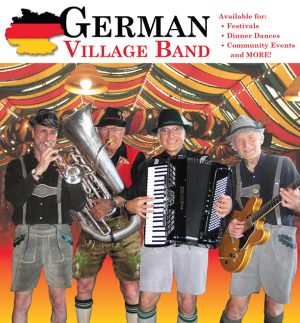
Ron with his German band: Dave Alt, trumpet, Billy Robinson, tuba, Ron Borelli, accordion, Tom Lander, guitar
Ron took over his father’s music business, and inherited business from other musicians who were retiring. “Growing up, playing the accordion with my father and doing all these gigs, I learned how to play Italian music, that was my first thing, then my teachers taught me all these American standards and ballroom dance tunes. As the years went on I was exposed to a lot of French music, German music, Tango music, etc. I would put a band together as needed. For instance, if someone calls me for an Oktoberfest, I have the outfits, I have the charts, and I can put together a four or five piece German band.”
Starting in the late 1970s, Ron studied classical piano with pianist and composer Julian White, and jazz with Don Haas, a very popular accordionist, pianist, and arranger. When Don got a call in 1997 to play in the SF Opera’s production of Berg’s Wozzeck, he recommended Ron. “There were six of us onstage playing in a bar scene. We were reading the music, it was very abstract, very contemporary. That was my first experience playing at the opera house. A year later the Three Tenors came to town and I got called to do that. That was the highlight–40,000 people in the San Jose Arena. It was really something.”
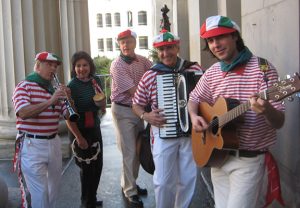
Ron’s Italian band: Vince Aguiar, clarinet, Carole Borelli, tambourine and vocals, Blake Richardson, bass, Ron Borelli, accordion, Luca Sirianna, guitar
“I was given a lot of work by an old-time accordionist, Michael Corino, who just passed away. He had a lot of the Italian community gigs, the same time as my father. My father and he were probably equals as far as getting Italian work. He also got a lot of jobs playing in the French community where there were a huge amount of French parties. When Mike got up in age he turned over his library of French tunes to me and gave me a couple names. All of a sudden I’m playing six, seven, eight French parties a year. Huge parties. Every year the French Club has a party for 1,000 people at the Marriott Grand Ballroom. It’s wild.”
In the 2000s Ron was called to play with a Local 6 Hungarian band for a scene in a TV show that was being shot on Treasure Island. The scene lasted two minutes on screen, but it took two days to film, plus overtime. “I’m still getting residuals because I’m a union musician. If I hadn’t been in the union I would have just gotten a flat amount and that would be it. The pay was really good for that one scene. Every now and then I get a check.”
Ron joined the union when he was twenty. He mostly does private events so he hasn’t been affected by the decline in union club work over the years. “I think for me, because I play accordion and piano, and I play different styles, I’ve always got something going on. Studying jazz theory with Don Haas and classical piano with Julian White enabled me to have this versatility—I can always put together whatever the client needs. And doing private parties I can demand more money. If I was just playing jazz, which I would love to be doing, I probably wouldn’t be working very much.”
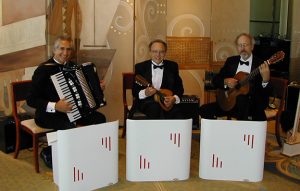
Trio Amoroso: Ron Borelli, accordion, Tony Kaye, guitar, Paul Binkley, mandolin
“Recently someone wanted to do a WWII themed party and I said, ‘Perfect, I’ll put a 7-piece band together playing music of that era for you.’ I had been given a 7-piece band book years ago, all music from the 20s and 30s, and I’d never had a chance to play through the charts. I hired these really great players and they sight-read the book. It was a great success.”
Ron says his years working in the bank taught him how to negotiate with clients. “Lots of times, a bride will call me about having my band play for their wedding. I’ll say ‘I’d like to make a recommendation. What do you think if we have accordion and violin at the beginning?’ And she’ll say, ‘Oh the accordion, I’m not sure about the accordion.’ I can tell right away she’s envisioning polkas, and she’s not thinking she wants polkas at her wedding. But I’m able to convince her that the accordion and violin sound beautiful together. And every time, when they’ve gone with my recommendation, they’ve said the accordion part was fabulous and it really changed their mind around.”
Ron now loves telling people he plays accordion. “It’s such a wacky instrument. It had a bad reputation for a long time but that’s turned around. It started about 25 years ago. All these accordion players were old enough to say ‘Do you think we should keep this thing alive and not let it totally disappear?’ They started accordion clubs and now there are accordion clubs all over the country. I’m a member of the San Francisco Accordion Club. We get together once a month.”
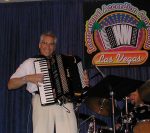
Ron performing at the 2010 International Accordion Convention in Las Vegas
To date, Ron has released two CDs and is working on his next project. He recently had an accordion piece played in a program on Public Television.
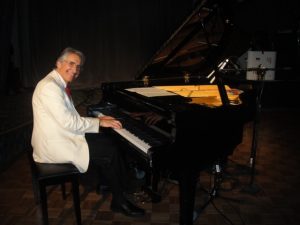
“Music makes me feel complete. All my emotions really come out in the music. Especially when I’m playing a party and I can make all these people do these happy things, dance and have fun. It does something for me and I think I’m sharing it with other people too.”
In 2015, Ron was called to perform with the San Francisco Opera again. “It was so exciting! Me, a bass player and drummer were onstage in costume doing a dance scene accompanying the tenor. I played a little bit solo and some with the orchestra. I don’t do that kind of thing all the time so it was quite a challenge. Right after that the SF Symphony called me to play the accordion parts for the Godfather.”
Today, Ron relishes his time and continues to hone his skills. “I work on music harder than I ever have in my life. Not having a day job, I’m able to practice more. When I get a call for a big event I have time to prepare for it and not be totally wiped out thinking, ‘How am I going to just get through the night and play?’”
Ron continues to network and get new clients through word of mouth. “I don’t market myself at all. Every year I get worried. In January I say to my wife, ‘Gee, the phone’s not ringing off the hook. I wonder if I’ll get any gigs this year?’ But things always start developing.”
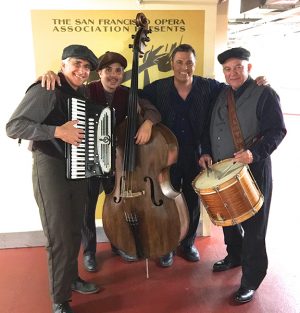
Ron performed in the San Francisco Opera production of “Two Women” Ron Borelli, accordion, Steve D’Amico, string bass, Pasquale Esposito, tenor, Richard Kvistad, percussion
Ron says he does not regret working in the bank for all those years. “It taught me valuable business skills and provided financial security which allowed me to make the transition to fulltime musician. I’ve never been happier.”
